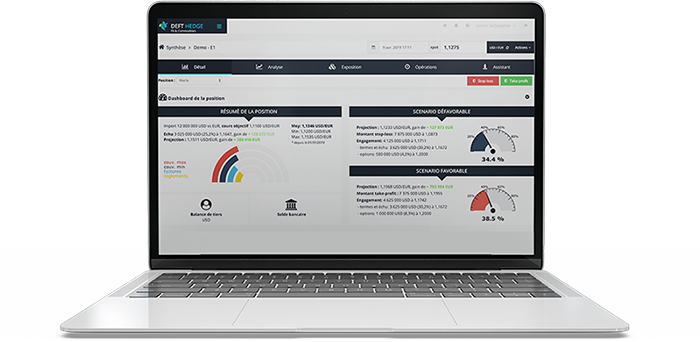Exchange rate volatility

In financial markets, asset prices constantly fluctuate, which is referred to as volatility. Volatility quantifies the risk of returns based on these fluctuations.
Volatility appears as a crucial indicator to consider in financial operations as it allows one to anticipate potential gains as well as potential losses in a financial transaction.
When exchange rates are involved in a financial transaction, the concept of volatility helps assess variations in the exchange rates and, in turn, evaluate the foreign exchange risk. To minimize risks associated with exchange rate fluctuations, a good understanding of the markets and the use of appropriate financial tools are essential.
To assist you in your investment strategy, DeftHedge offers a dedicated SaaS software for businesses looking to optimize their buying and selling operations in the markets.
What is exchange rate volatility?
The higher the volatility, the greater the potential short-term profitability, but on the flip side, the potential losses can also be significant. By opting for an asset with high volatility, the investor is taking on a certain level of risk.
Applied to exchange rates, volatility allows financial market participants to estimate future variations in currency values.
As exchange rates fluctuate daily, they have a significant impact on commercial transactions.
Indeed, depending on various factors directly affecting the value of a currency, economic market players will adapt their strategies. Forex, also known as the foreign exchange market, is considered a highly volatile market. This volatility among currencies can take various forms:
- Historical volatility: estimates based on periods ranging from 10 to 180 days.
- Implied volatility: estimates based on expectations of future supply and demand.
- Intraday volatility: estimates based on fluctuations between market opening and closing prices.
In financial operations, exchange rate volatility is therefore a crucial criterion to consider. To minimize the risk of financial losses related to exchange rate fluctuations, it is important to calculate this volatility.
How to calculate exchange rate volatility?
To anticipate the risk associated with exchange rate fluctuations, it is possible to calculate the volatility of these values. To perform this calculation, you should measure the range between the highest and lowest prices on previous trading days.
This calculation will help determine the standard deviation and, in turn, the volatility rate between exchange rates. Several steps make up this calculation:
- Take into account the closing prices on one or more days.
- Calculate the average of these prices.
- Find the deviation of each of the prices.
- Match the squared deviations.
- Calculate the square root to obtain the standard deviation.
While this calculation can be done manually, it is advantageous for businesses to use tools like DeftHedge. With this software, you can easily and quickly obtain the volatility rate in the foreign exchange market.


What influences the foreign exchange market?
Exchange rates between currencies are not fixed values. Indeed, numerous external factors impact currency rates on a daily basis and have significant effects on global exchange markets. The foreign exchange market is influenced by various factors from each country:
- Interest rates
- Economic growth
- Public debt
- Inflation
- Current account balance
- Geopolitical events
- Currency status
- Central bank monetary policies
All of these criteria play a considerable role in the fluctuation of a currency’s value and consequently have a significant impact on the foreign exchange market.
Volatility: Advantages and Disadvantages
Whether in the foreign exchange market or other financial markets, the volatility of prices carries significant weight in transactions. Exchange rate instability is a significant factor to consider when you intend to conduct a transaction.
Indeed, high volatility represents a real opportunity to increase your profits in a financial operation. The risk taken by investors can, therefore, be rewarded with substantial profits.
While this risk-taking can be advantageous, it is important to note that losses can also be substantial. Even if the changes in certain factors affecting exchange rates can be anticipated, there is always uncertainty that can have negative consequences in carrying out a financial operation.
To develop the best strategy in the foreign exchange market, it is important to determine the level of risk you are willing to take and the profits you aim to achieve.
FOREX: A Particularly Volatile Market
Regardless of the type of investment made in a financial market, considering the concept of volatility is an essential criterion. In the case of the FOREX market (foreign exchange market), volatility can be particularly influenced by the economic and political conditions of countries.
Even though central banks implement measures to prevent overly intense fluctuations in exchange rates, the value of currencies is not immune to sometimes significant fluctuations.
If you intend to trade in the FOREX market, it is important to carefully define your strategy and establish a maximum volatility rate for your investments.
How does our software help you deal with foreign exchange market volatility?
Regardless of the type of investment made in a financial market, considering the concept of volatility is an essential criterion. In the case of the FOREX market (foreign exchange market), volatility can be particularly influenced by the economic and political conditions of countries.
To minimize the risk of losses and accurately predict future market developments, the use of suitable and effective tools for your investments is necessary. To enable companies to conduct the best operations in the markets, DeftHedge has developed a specially tailored SaaS software to meet their needs.
A High-Performance Software
Thanks to DeftHedge, professionals have access to a high-performance software for managing risks associated with exchange rate volatility. This tool compiles extensive information about the foreign exchange market, enabling companies to adapt their strategies effectively and accurately assess the risks associated with their operations.
Ensuring compliance with international accounting and financial standards, DeftHedge is a quality tool for conducting your investments with peace of mind.
With our solution, you can establish a high-performing financial strategy while minimizing the risks of losses associated with market volatility.
To assist businesses in implementing the best possible strategy in the foreign exchange market, our software comprises multiple features, including ‘SmartStrategy.’ This functionality allows you to simulate various strategies and observe their different positive or negative effects.
With “SmartStrategy” you can prepare and align your strategy before entering the markets. Thanks to its features, DeftHedge serves as a valuable decision-making tool for professionals.”
An advantageous solution for your financial strategy
With DeftHedge, businesses gain access to a wealth of information to develop the best strategy in financial markets.
This comprehensive, SaaS software allows them to better understand the effects of exchange rate volatility and maximize their investments.
Regardless of the size of your company (small, medium, large), DeftHedge brings you numerous advantages in your daily operations:
- Monotoring and management of exchange rates
- Automation of certain daily tasks.
- Support for your investment strategies.
- Centralization and security of your data.
- Reduction of losses due to market volatility.
To enable businesses to conduct the best financial operations possible, DeftHedge offers a high-performance software tailored to the needs of all professionals.
To assist you in getting the most out of this software and to help you make the most of all its benefits, DeftHedge’s teams are there to advise you and answer your questions.
Thanks to our powerful and comprehensive SaaS solution, you can better anticipate the effects of exchange rate volatility and optimize your gains related to your financial strategy.
